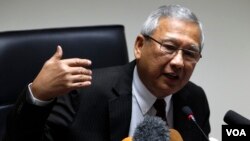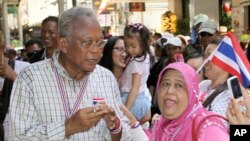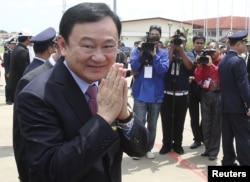BANGKOK —
Demonstrators trying to bring down Thailand’s beleaguered government left behind their encampment in a Bangkok park and set up a new base near the traditional seat of government on Monday. But the caretaker prime minister, speaking to reporters for the first time in his new role, insists elections remain the best way forward.
Protesters set out from Lumpini Park Monday in a now familiar march through the city, making their way to a new camp near the United Nations main office, the Army headquarters and the Government House compound.
Ministers of the weakened government are nowhere near the primary government complex, which has not been used by it for months amid large protests.
The interim prime minister is working out of an office in a distant suburb.
Caretaker PM addresses media
Niwatthamrong Boongsongpaisan, who assumed office last week, was asked by foreign correspondents Monday why authorities are not moving against those leading the anti-government movement.
“We don’t want violence to happen. We don’t want any killings. We don’t want to hurt anybody,” he said.
The caretaker leader insists that “by law we are legitimate to stay on until we have the new elected government.”
Niwatthamrong expressed hope that a meeting between the caretaker government and the election commission, scheduled for Wednesday, would agree on a July 20 date for nationwide polling.
But the main opposition Democrat Party has no given no indication that it will participate.
Protest leader Suthep Taugsuban has rejected the appointment of the caretaker and had called for the Senate, along with judges and the election commission to appoint a new one. But there appeared to be little support for the proposal among the judiciary.
A spokesperson for the protesters, Akanat Promphan, contends the group’s plan is the only way to resolve the impasse.
“We’re just hoping that those that have the power - for example the Senate - will come together with the people and try to find a quick solution by establishing a new functioning government that will be able and have the pose to resolve all the problems and also push forward reform,” said Akanat Promphan.
Demonstrators' plan rejected
The Center for the Administration of Peace and Order, known as CAPO, a combined force of police and soldiers, rejects the plan, saying the country already has a caretaker prime minister.
CAPO spokesperson Sirima Sunawin says trying to invoke Article 7 of the Thai constitution in this manner is not only misleading the public.
“Their demand is not only illegal, but also intensify conflicts among groups in the society which may lead to violence, confrontation and even a civil war,” said Sirima Sunawin.
When reporters asked interim prime minister Niwattamrong if the county could split apart, he replied, “I don’t think we’ll have civil war.”
About 15 kilometers away from the occupied Government House grounds, pro-government “red shirt” supporters are also rallying.
The distance has meant, so far, there have been no clashes between the rival groups.
Army in "wait-and-see" mode
There is widespread anticipation that any violence between the two could lead to intervention by Thailand’s powerful and respected military.
The army has launched 18 coup attempts since the early 1930s.
Generals, in recent weeks, have insisted another coup is not the solution to the country’s political infighting. The army chief, Prayuth Chan-ocha was quoted on Saturday saying that any action by soldiers would only come as a “last resort.”
That comment came a day after a key figure in the “yellow shirts” street protests that led to a 2006 coup, Sondhi Limthongkul, told a street rally “a coup is not always a bad thing if it changes the nation for the better.”
The roots of the current trouble go back to 2006 when street demonstrations led to the military removing prime minister Thaksin Shinawatra. The telecommunications tycoon turned politician still enjoys broad support in Thailand’s agrarian north. Many urban elites fiercely oppose him and his sister, Yingluck Shinawatra, elected prime minister in 2011.
She was forced out of office by a court decision last week which her supporters regard as a “judicial coup.” They also contend that Niwattamrong, as a former executive of a now defunct TV station owned by Thaksin, is influenced by the ex-prime minister.
The ongoing political crisis in the kingdom is prompting concern domestically and abroad about the country’s long-term stability.
Foreign ministers, at a summit in Naypyitaw of the Association of Southeast Asian Nations (ASEAN) on Sunday, called for Thailand to resolve its political troubles through talks by respecting democratic principles and the rule of law.
Thailand was the only ASEAN country not represented by its government’s leader at the summit.
Protesters set out from Lumpini Park Monday in a now familiar march through the city, making their way to a new camp near the United Nations main office, the Army headquarters and the Government House compound.
Ministers of the weakened government are nowhere near the primary government complex, which has not been used by it for months amid large protests.
The interim prime minister is working out of an office in a distant suburb.
Caretaker PM addresses media
Niwatthamrong Boongsongpaisan, who assumed office last week, was asked by foreign correspondents Monday why authorities are not moving against those leading the anti-government movement.
“We don’t want violence to happen. We don’t want any killings. We don’t want to hurt anybody,” he said.
The caretaker leader insists that “by law we are legitimate to stay on until we have the new elected government.”
Niwatthamrong expressed hope that a meeting between the caretaker government and the election commission, scheduled for Wednesday, would agree on a July 20 date for nationwide polling.
But the main opposition Democrat Party has no given no indication that it will participate.
Protest leader Suthep Taugsuban has rejected the appointment of the caretaker and had called for the Senate, along with judges and the election commission to appoint a new one. But there appeared to be little support for the proposal among the judiciary.
A spokesperson for the protesters, Akanat Promphan, contends the group’s plan is the only way to resolve the impasse.
“We’re just hoping that those that have the power - for example the Senate - will come together with the people and try to find a quick solution by establishing a new functioning government that will be able and have the pose to resolve all the problems and also push forward reform,” said Akanat Promphan.
Demonstrators' plan rejected
The Center for the Administration of Peace and Order, known as CAPO, a combined force of police and soldiers, rejects the plan, saying the country already has a caretaker prime minister.
CAPO spokesperson Sirima Sunawin says trying to invoke Article 7 of the Thai constitution in this manner is not only misleading the public.
“Their demand is not only illegal, but also intensify conflicts among groups in the society which may lead to violence, confrontation and even a civil war,” said Sirima Sunawin.
When reporters asked interim prime minister Niwattamrong if the county could split apart, he replied, “I don’t think we’ll have civil war.”
About 15 kilometers away from the occupied Government House grounds, pro-government “red shirt” supporters are also rallying.
The distance has meant, so far, there have been no clashes between the rival groups.
Army in "wait-and-see" mode
There is widespread anticipation that any violence between the two could lead to intervention by Thailand’s powerful and respected military.
The army has launched 18 coup attempts since the early 1930s.
Generals, in recent weeks, have insisted another coup is not the solution to the country’s political infighting. The army chief, Prayuth Chan-ocha was quoted on Saturday saying that any action by soldiers would only come as a “last resort.”
That comment came a day after a key figure in the “yellow shirts” street protests that led to a 2006 coup, Sondhi Limthongkul, told a street rally “a coup is not always a bad thing if it changes the nation for the better.”
The roots of the current trouble go back to 2006 when street demonstrations led to the military removing prime minister Thaksin Shinawatra. The telecommunications tycoon turned politician still enjoys broad support in Thailand’s agrarian north. Many urban elites fiercely oppose him and his sister, Yingluck Shinawatra, elected prime minister in 2011.
She was forced out of office by a court decision last week which her supporters regard as a “judicial coup.” They also contend that Niwattamrong, as a former executive of a now defunct TV station owned by Thaksin, is influenced by the ex-prime minister.
The ongoing political crisis in the kingdom is prompting concern domestically and abroad about the country’s long-term stability.
Foreign ministers, at a summit in Naypyitaw of the Association of Southeast Asian Nations (ASEAN) on Sunday, called for Thailand to resolve its political troubles through talks by respecting democratic principles and the rule of law.
Thailand was the only ASEAN country not represented by its government’s leader at the summit.








